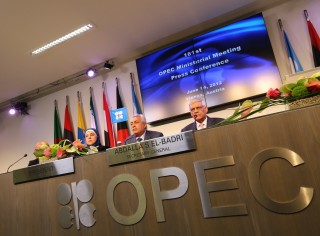Ahead of the OPEC and OPEC+ virtual meeting in Vienna on Thursday, April 9, 2020, the African Energy Chamber (AEC) has urged both parties to reach a deal on ending the current oil price war.
Last month, OPEC failed to reach a deal on maintaining production cuts leaving major oil producers to ramp up production in a bid to maintain and increase their market share. Increased supply came on top of a demand shock due to the COVID-19 pandemic, and sent oil prices at a historic low averaging $20.
Prior to the meeting which will be watched closely by global oil producers, traders, and other market participants, AEC encouraged OPEC and OPEC+ to work together and arrive at a deal that will restore market stability. The situation in Africa’s oil economies is dire and the continent needs an exceptional deal to ensure the continuity and survival of its industry.
African oil-producing countries such as Angola, Senegal, Ghana, Cameroon, and Nigeria have been among the most hard hit by the COVID-19 pandemic and a declining oil price. Following the crash of global oil prices, key projects on the continent awaiting FID such as ExxonMobil’s Rovuma LNG have been delayed. In Senegal, Cairn Energy reduced its planned investment to below $330 million from the initial forecast of $400 million. Other projects already on the move, such as Senegal’s Greater Tortue Ahmeyim, are seeing an extension of their timeline to provide for CAPEX cuts.
The fall in oil prices coupled with the coronavirus pandemic has also had heavy impacts on Ghana’s oil industry. Oil production activities have been delayed leading analysts to predict that the West African country will get half its projected oil revenue. Similarly, several drilling contracts have been terminated or canceled across the African continent. Time-bent drilling operations in The Gambia or Angola have been put on hold, if lingered far enough, it will result in the massive loss of jobs in the African energy sector.
In addition, NJ Ayuk, an Executive Chairman at AEC estimated that Nigeria is at risk to suffer the biggest loss in Africa. “With the low oil price pushing the country to cut its budget and companies to reduce their CAPEX, the globe is waiting to see Nigeria’s next move,” NJ Ayuk said. Nevertheless, the Executive Chairman at AEC added that “although it is hard to see the light for Nigeria, with the commitment of companies and resilience of the government, the country can certainly weather the storm.”
With the twin crises of the COVID-19 country lockdowns and oil prices war, it has left a devastating effect on Africa and its producing countries and companies. Nj Ayuk, therefore urged OPEC, OPEC+ Members, and African producers, to support all efforts to reach a deal that will “bring the stability we need to see the end of the tunnel.”
Furthermore, while the Chamber is assertive that market forces have to work and shape the future of the industry, government and diverse energy sectors in Africa should not remain dormant. AEC encouraged Africa’s oil-producing nations to immediately adapt to these global changes, implement incentives and plan for the future.
The current dual global crisis can be resolved only through continued commitment, support, and collaboration between OPEC and OPEC+ countries coupled together with global oil-producing companies. “Following our conversation with US producers, we believe there needs to be a bigger dialogue with shale producers in North America and OPEC Members. This is the collaboration that the market needs to be stabilized and prevent future volatility,” Nj Ayuk concluded.








